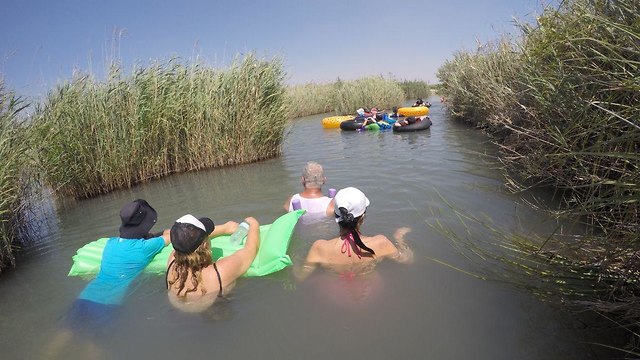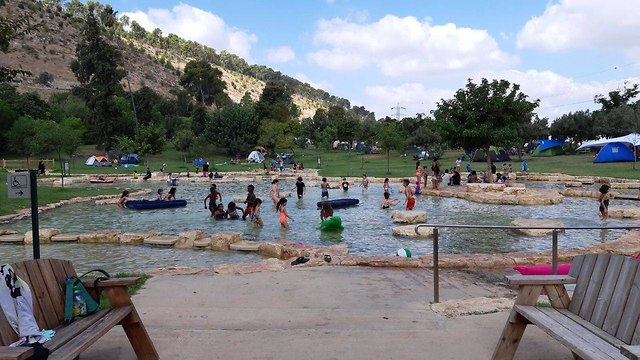
Health Ministry to undertake measures to combat leptospirosis outbreak
During emergency discussion headed by Deputy Minister Litzman, it is decided government ministries will work in a coordinated manner to undertake immediate steps in order to eradicate the disease, which include vaccinating infected cattle herds and upgrading levels of sanitation; 'Leptospirosis will not be an issue next summer,' says director-general of the Health Ministry.
During the meeting it was revealed that 42 people have been infected with the virus so far and there are another 242 suspected cases of infection.
Deputy Health Minister Yaakov Litzman addressed the situation, warning the public from entering the infected area.
"We think the situation is under control. We ask the public to comply with the instructions of professionals and to stay away from entering potentially dangerous areas," Litzman added.
Among other attendees were also Deputy General of the Health Ministry Moshe Bar Siman Tov, Deputy Director General of the Health Ministry Prof. Itamar Grotto, Director General of the Ministry of Tourism Amir Halevi and representatives of the Ministry of Environmental Protection, the Nature and Parks Authority, the Water Authority, the Cattle Breeders Association and local councils.
It was decided that various government ministries will work together in a coordinated manner in order to eradicate the disease, with a number of steps to be implemented soon, which include:
1. Regulating the sources of drinking and grazing areas of cattle herds, as well as fencing the springs in order to prevent cattle from accessing the water sources.
2. The flowing of water by the Water Authority into the springs. It was clarified that the efforts should mostly be invested in regulating the livestock and wild boars that transmit the disease.
3. Vaccination of infected cattle herds.
4. Activities to improve levels of sanitation by the local authorities.
In addition, the Ministry of Health will continue to update the public on a regular basis regarding a state of the infected streams and springs.
"The Health Ministry is examining the streams, closely supervising the matter," Litzman said in comments to the media ahead of the discussion. "The streams that are bad, the ministry closes. And the ones that are good, it leaves open.
Moshe Bar Siman Tov assured that "things are under control, and we're monitoring both the water sources and the sickness patterns on a daily basis. Heed our instructions, because there have been a lot of unfounded, false and biased things (being said)."
He said that with cooperation from all authorities invited to the emergency discussion, leptospirosis will not be an issue next summer.
Prof. Itamar Grotto said the list of locations that are unsafe is "constantly being updated" on the Health Ministry's website.
"It's important to stress that there are no limitations everywhere else (that is not on the list), and leptospirosis cannot be contracted through the air or in pool water," Prof. Grotto said, adding it's safe to travel in northern Israel.
The Nature and Parks Authority reported Saturday that the number of visitors to north Israel’s water destinations has dropped due to the leptospirosis scare.
At Horshat Tal, the number of visitors dropped from 1,800 to 800 in a week. In Nahal Snir, visitor numbers dropped from 1,650 to 700, and Gan Hashlosha saw only 1,700 visitors, 1,100 less than last week.
The reason for the infection outbreak is yet unclear. It is thought to be related to cattle herds that graze in the Golan Heights and contaminated streams with feces, as well as low volume flow due to the continuing drought.
Prof. Michal Hovers, who runs the infectious diseases unit at the Meir Hospital in Kfar Saba, explained that the infection is caused by the Leptospira bacteria, which originates in animals.
"Animals infected the waters and streams, and people who either bathe there or come into contact with mice urine in outdoor habitats can catch this infection," she said in an interview with Ynet.
"Symptoms can be mild in some cases but in others the infection can become severe and lead to kidney and liver failure,” she continued.
Prof. Hovers added that symptoms include fever, flu-like symptoms and sometimes corneal infections but emphasized that not all symptoms require admission to hospital.
The ministry listed several streams the public is not allowed to enter: Zaki, Yehudiya, Meshushim, Zavitan, Jilabun, and Daliyot (at the Majrassa Nature Reserve), as well as the Jordan River (only in the Jordan Park area).
Those who came into contact with either water or wet mud from the infected streams since the start of July and are suffering from fever higher than 38C for more than 24 hours during a period of less than three weeks after initial contact are advised to call their GP.
The ministry emphasizes that pregnant women, the elderly, children and people suffering from chronic diseases are at a greater risk of being infected.














